
Giant Gippsland Earthworm
A Giant Gippsland Earthworm (GGE) Information Session & Field Day was held on Monday 9th of September, 2013. The event was hosted by Peter & Wilma
Mackay who have run a dairy operation for nearly forty years on their Poowong East farm. They have a number of GGE colonies on the property.
The information day was part of a project aimed at providing private landholders with information about the biology and habits of this fascinating creature
that only occurs in South and West Gippsland, and to help landholders identify and manage their GGE habitat.
Click to enlarge
Click to enlarge
Wilma, Beverley & Peter
Presentation
The information/field day was a gurgling success. There were eighteen attendees from the local and not so local area. Dr Beverley Van Praagh gave a
presentation on the history, biology and habitat requirements of the species.
We then donned gumboots and headed off to visit one of the GGE colonies closest to the farm. The worms were quite active with lots of gurgling and
squelching noises much to the delight of those present. Their activity may have had something to do with recent rain. The GGE site is located in pasture on a
southward facing slope above a creek.
Beverley exposed the first few centimetres of
soil to look for GGE burrows and show the
lovely clay soils preferred by these giants
We finished off the day with a delicious lunch
The project looked for suitable properties to take part in a trial of different revegetation techniques to find out what plants species are best suited to GGEs
and the recommended proximity of planting to colonies. While revegetation normally has a host of environmental benefits, in the case of GGEs it may affect
the local hydrology by drying out sites and making them unsuitable.
These properties then act as demonstration sites that other landholders can visit to see how they can revegetate in a precautionary way so as not to affect
GGE colonies. Ideally, the type of sites looked for were:
•
Landholders who were sure they had GGE colonies on their property (had heard gurgle recently e.g. over winter)
•
Landholders who were willing to fence and revegetate certain areas
•
Streamside sites or south facing slopes as these are typical GGE habitat
•
A dairy farm in particular to see how the worms cope with this type of intensive land use
Click here to view more photographs from the Information Session & Field day.





Click any image to enlarge
Website by VP-IT
All photographs © Dr. Beverley Van Praagh, Invert-Eco unless otherwise stated. No image may be saved, copied, reproduced or distributed without prior permission from the copyright owner.
Email: info@giantearthworm.org.au
Giant Gippsland Earthworm (GGE) 2013 Information Session & Field Day A Great Success!


Giant Gippsland Earthworm
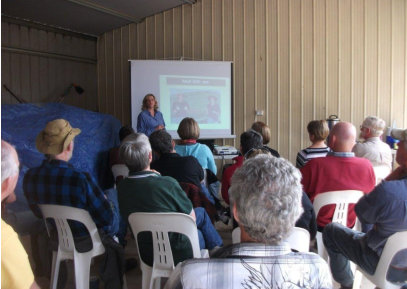
A Giant Gippsland Earthworm (GGE) Information Session &
Field Day was held on Monday 9th of September, 2013.
The event was hosted by Peter & Wilma Mackay who have
run a dairy operation for nearly forty years on their
Poowong East farm. They have a number of GGE colonies
on the property.
The information day was part of a project aimed at
providing private landholders with information about the
biology and habits of this fascinating creature that only
occurs in South and West Gippsland, and to help
landholders identify and manage their GGE habitat.
Click to enlarge
Click to enlarge
Wilma, Beverley & Peter
Presentation
The information/field day was a gurgling success. There
were eighteen attendees from the local and not so local
area. Dr Beverley Van Praagh gave a presentation on the
history, biology and habitat requirements of the species.
We then donned gumboots and headed off to visit one of
the GGE colonies closest to the farm. The worms were quite
active with lots of gurgling and squelching noises much to
the delight of those present. Their activity may have had
something to do with recent rain. The GGE site is located in
pasture on a southward facing slope above a creek.
Beverley exposed the first few centimetres of
soil to look for GGE burrows and show the
lovely clay soils preferred by these giants
We finished off the day with a delicious lunch
The project looked for suitable properties to take part in a
trial of different revegetation techniques to find out what
plants species are best suited to GGEs and the
recommended proximity of planting to colonies. While
revegetation normally has a host of environmental benefits,
in the case of GGEs it may affect the local hydrology by
drying out sites and making them unsuitable.
These properties then act as demonstration sites that other
landholders can visit to see how they can revegetate in a
precautionary way so as not to affect GGE colonies. Ideally,
the type of sites looked for were:
•
Landholders who were sure they had GGE colonies on
their property (had heard gurgle recently e.g. over
winter)
•
Landholders who were willing to fence and revegetate
certain areas
•
Streamside sites or south facing slopes as these are
typical GGE habitat
•
A dairy farm in particular to see how the worms cope
with this type of intensive land use
Click here to view more photographs from the Information
Session & Field day.

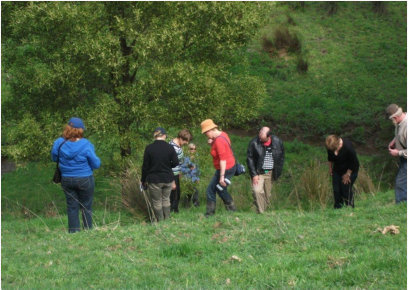
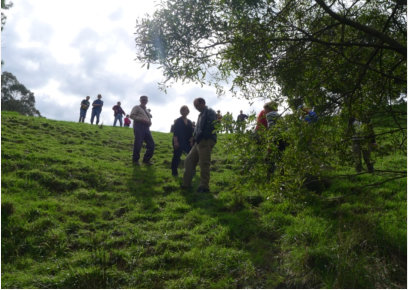
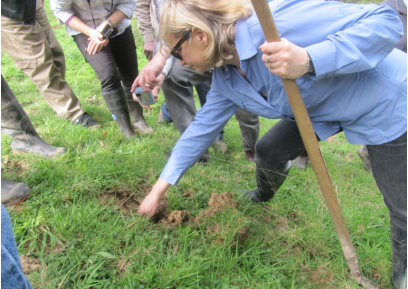
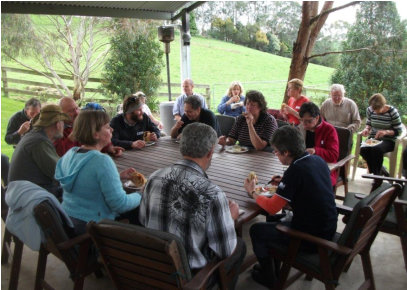
Click any image to enlarge
Giant Gippsland Earthworm (GGE) 2013
Information Session & Field Day A
Great Success!
All photographs © Dr. Beverley Van Praagh, Invert-Eco unless otherwise stated.
No image may be saved, copied, reproduced or distributed without prior
permission from the copyright owner.
Email: info@giantearthworm.org.au
Website by VP-IT


Caring For Our Country 2013-2015
Project
• Project Profile • 2013 GGE Information Session & Field Day Report • GGE Field Day 2 Report • Slippery Slopes And Giant Earthworms Case Study • Planting for Giant Gippsland Earthworms Along Creeks Case Study • GGE Revegetation Demonstration Sites - 5 years on

















